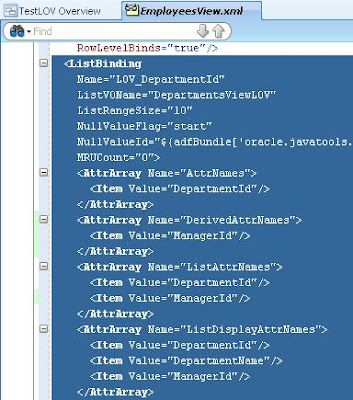In some cases we have LOVs in detail view objects that are dependent on an attribute on a master view object.
For example in Departments Employees Master detail, you want to have a list of values for Employees managers to be the department Manager or employees that have the department manager. The LOV query would be :
select *
from employees
where manager_id = :inManager
or employee_id = :inManager
In the view accessor for the LOV you can set the bind variable of the LOV to get value from the master view object ‘DepartmentsView.ManagerId’ or in the employees view object you can add Departments entity and add attribute ManagerId from Departments Entity.

Yet when you change Manager of the Department in both cases the LOV does not know that the bindVariable value has changed and it is still executed with the old value of Department value.
This is happening because the LOV is notified to take new bind value when the setter of the dependent attribute is invoked.
In order to do that I created an updatable transient attribute LOVManagerId that on the getter when it has no internal value it gets the value from Departments entity reference attribute.
public Number getLOVManagerId() {
if (getAttributeInternal(LOVMANAGERID)==null)
return this.getDepartmentManagerId();
return (Number) getAttributeInternal(LOVMANAGERID);
}

Now on the getter of reference entity attribute I check if entity attribute has changed in order to set also the LOVManagerId.
public Number getDepartmentManagerId() { Number empdepManager = (Number) getAttributeInternal(DEPARTMENTMANAGERID); if (this.getDepartments().isAttributeChanged("ManagerId")) this.setLOVManagerId(empdepManager); return empdepManager; }Partial triggers form Department.ManagerId field to Employees table will finish the job.

Test Case :
http://adfbugs.googlecode.com/files/MasterDependentLOV.zip














